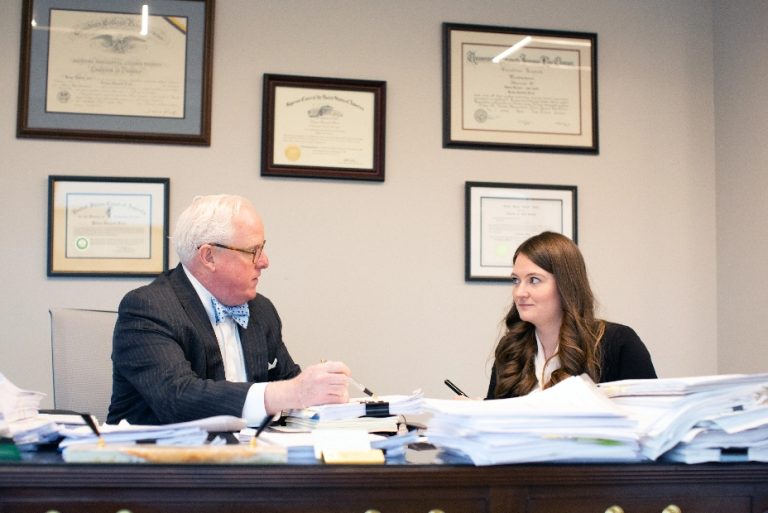Mark E. Miller

Overview
With almost 30 years of litigating and settling insurance claims, and prior Fortune 500 executive experience before that, Mr. Miller brings clients seasoned business-oriented solutions to virtually any kind of insurance issue.
His experience ranges from settling some of the largest property damage and business interruption claims in the world, to litigating coverage for some of the biggest fraud losses ever suffered. Mr. Miller and others at Miller Friel also delivered the largest punitive damages jury verdict in an insurance property damage case ever reported.
Prior to co-founding Miller Friel, PLLC, Mr. Miller was a principal shareholder at the international law firm of Greenberg Traurig LLP, where he, along with Brian Friel, managed the firm’s Insurance Recovery and Advisory Practice Group.
His views on insurance have been published in many prominent publications, including Forbes, Business Insurance, Legal Times, Treasury and Risk Management, Risk, and The National Law Journal, and he is a frequent speaker on insurance issues for the Practicing Law Institute (“PLI”) Mr. Miller received his B.S. from Allegheny College, his M.S. from the University of Cincinnati, his M.B.A. from Houston Christian University, and his J.D. from South Texas College of Law, where he was an Editor of the South Texas Law Review.
5th Circ. Ruling Aids Policyholder Deductible Calculations, December 29, 2021
Policyholder Earns Massive Coverage Win for BIPA Claims, November 24, 2021
Insurance Coverage for Biometric Data Privacy Claims, August 10, 2021
BIPA Ruling Marks Critical Win For Silent Cyber Coverage, June 9, 2021
D&O Insurance Implications From Tesla’s Stock Drop Suit, April 5, 2021
The Tide Turns in Favor of COVID-19 Policyholders, April 9, 2021
Virus Coverage Ruling Could Turn Scales For Insureds, December 17, 2020
Golf Fans Outraged by Insurance Company Conduct, December 14, 2020
Inconsistencies Haunt Environmental Insurers’ Covid-19 Claims Denials, November 18, 2020
BIPA Claim Coverage Denials Lack Merit, October 28, 2020
Road Map to Insurance Coverage for COVID-19 Business Interruption Losses, October 26, 2020
Fifth Circuit’s “Windstorm” Ruling Holds Silver Lining For Policyholders, July 22, 2020
Future Battles Foreshadowed In First COVID-19 Insurance Suit, March 28, 2020
Insurance Coverage For Revived Claims Under The NY Child Victims Act, July 18, 2019
Who is Winning the Covid-19 Insurance Coverage Fight?, May 17, 2021
Insurance Companies Will Pay for CV-19 Losses, May 6, 2020
Coronavirus Insurance Coverage Implications — Good News, March 13, 2020
Two Common Mistakes Policyholders Make with Property Insurance Claims, February 23, 2020
Is Lloyd’s of London Still Relevant?, November 26, 2019
Funny Insurance Decision — The Tale of the Malicious Raccoons, October 15, 2019
Lloyd’s of London. Then and Now, October 7, 2019
Cyber Insurance: What the Educated Policyholder Needs to Know Now, October 1, 2019
Insurance Coverage for Sexual Abuse Claims, September 27, 2019
The Craziest Insurance Defense Ever, June 21, 2019
Cyber Insurance Claims and Coverage, September 5, 2018
The Role of An Insurance Broker: To Keep Lawyers from Giving Advice?, August 6, 2019
Why Insurance Carriers Prefer Insurance Coverage Arbitration Over Litigation, August 2, 2019
Cyber Insurance for Business Interruption Losses, July 31, 2018
Notice For Governmental Investigations – Navigating Insurance Traps, June 26, 2018
Insurance Coverage Litigation – Insurer and Policyholder Perspectives, June 19, 2018
Insurance Policy Enhancements to Coverage, June 14, 2018
Insurance Broker RFPs, June 11, 2018
Top Ten Insurance Recovery Issues For Corporate Policyholders, July 27, 2017
Business Checklist To Maximize Hurricane Insurance, October 12, 2016
When Should You Sue Your Insurance Carrier – An FCPA Investigation Case Study, September 15, 2016
Insurance Recovery Law: History’s Best Decisions: The Brillhart Decision, September 13, 2016
Insurance Recovery Law: History’s Best Decisions: The Penford Case, September 8, 2016
D&O Insurance Coverage for Government Investigations, September 7, 2016
Reversing Insurance Claim Denials Part 3: Negotiating a Resolution, September 1, 2016
Reversing Insurance Claim Denials Part 2: Credibly Analyze Claim Denial Letters, August 30, 2016
Reversing Insurance Claim Denials Part 1: Don’t Believe Claim Denial Letters, August 26, 2016
Property Insurance Claims: The Value of a Second Look, August 24, 2016
Insurance Recovery Law: What 17th Century Piracy Teaches Us About Property Insurance, August 12, 2016
Insurance Recovery Law: History’s Best Decisions: Fountain Powerboat, August 11, 2016
Five Things You Need to Know About Property Insurance: 5) The Only Way To Maximize The Value Of Your Claim Is To Understand The Law, August 5, 2016
Five Things You Need to Know About Property Insurance: 4) Most Property Claims Settle, August 3, 2016
Five Things You Need to Know About Property Insurance: 3) Insurance Company Accountants Need To Be Questioned, July 28, 2016
Five Things You Need to Know About Property Insurance: 2) Presentation of the Claim is Everything, July 26, 2016
Five Things You Need to Know About Property Insurance: 1) When You Make a Property Insurance Claim, You Are Stepping Into a Minefield, July 19, 2016
Five Things You Need to Know About General Liability Insurance: 5) Don’t Fall For The Consent To Settle Trap, July 14, 2016
Five Things You Need to Know About General Liability Insurance: 3) The Right to Select Your Own Counsel, July 8, 2016
Five Things You Need to Know About General Liability Insurance: 2) “Notice” is Not as Easy as You Might Think, July 5, 2016
Five Things You Need to Know About General Liability Insurance: 1) It Covers a Lot More Than You Might Think, June 29, 2016
Can Defense Panel Counsel Effectively Handle Insurance Claims? Part Two, June 23, 2016
Can Defense Panel Counsel Effectively Handle Insurance Claims? Part One, June 21, 2016
Five Things You Need To Know About D&O Insurance: 5) Indemnity Obligations, June 14, 2016
Five Things You Need To Know About D&O Insurance: 4) Improper Defense Tactics, June 9, 2016
Five Things You Need To Know About D&O Insurance: 3) Improper Claim Denials Are Common, May 31, 2016
Five Things You Need To Know About D&O Insurance : 2) Notice, May 26, 2016
Five Things You Need To Know About D&O Insurance: 1) Coverage Is Incredibly Broad, May 24, 2016
$48 Million Business Interruption Loss Affirmed by New York Court, May 10, 2016
#10 Insurance Issue For Non-Insurance Lawyers: Privilege, April 19, 2016
#9 Insurance Issue For Non-Insurance Lawyers: Insurance Coverage For Criminal Activities, April 15, 2016
Texas Court Slams Insurer Mantra of No Coverage for Restitution and Disgorgement, April 11, 2016
#5 Insurance Issue for Non-Insurance Lawyers: Cyber and Intellectual Property (IP) Claims, March 29, 2016
#4 Independent Investigations: Insurance Issues For Non-Insurance Lawyers, March 25, 2016
#3 Governmental Investigations: Insurance Issues For Non-Insurance Lawyers, March 21, 2016
D&O Insurance in Make or Break the Company Situations, March 3, 2016
D&O Insurance — The True Value of Entity Coverage, March 1, 2016
Pigs Can Fly–Boilerplate Demand For “Other Relief” Can Trigger The Duty To Defend, February 19, 2016
Insurance Coverage for Employee Theft – The Making of a Thief, February 18, 2016
Event Cancellation Insurance Claim Denials — Tips for Recovery, February 12, 2016
How Corporations Utilize Contingencies to Manage Insurance Recovery Legal Costs, February 9, 2016
You Deserve A Break Today – Alternative Fee Structures for Insurance Recovery Law Firms, February 4, 2016
One Essential Thing That Insurance Recovery Lawyers Lack – An MBA, February 2, 2016
Avoiding the Dark Side: A Guide for Policyholders and Defense Counsel, January 15, 2016
Four Common Insurance Carrier Duty to Defend Tricks, January 8, 2016
Insurance Recovery Law: Candid and Accurate Advice, December 3, 2015
Court Slams Defense Counsel For Not Being D&O Insurance Experts, December 2, 2015
The A.E.R. Approach To Insurance Recovery Law: Best Practices for Resolving Insurance Claims, December 1, 2015
Moving Insurance Policies to Perfection Over Time, November 19, 2015
The Growth of Boutique Insurance Recovery Law Firms, November 3, 2015
Court Bars Challenge to Reasonableness of Defense Costs — Insurers Can’t Have Their Cake And Eat It Too, October 30, 2015
The Wild Wild West of Cyber and D&O Insurance, October 29, 2015
Building An Insurance Recovery Law Firm, October 20, 2015
Insurance Recovery Law Corporate Case Study, October 8, 2015
Our Sole Focus On Insurance Recovery Law Leads To Greater Efficiency, October 1, 2015
Insurance Recovery Law – There is a Better Way, September 30, 2015
Insurance Recovery Specialists – Experience Matters, September 22, 2015
Insurers Must Pay for Potentially Covered Settlements, September 11, 2015
Insurance Coverage For Whistleblower Lawsuits, September 2, 2015
Court Finds Coverage for Willful Statutory Damages — Don’t Get Fooled [by your Insurance Carrier] Again, August 24, 2015
Health Care Provider E&O Insurance – A Decisive Victory for Policyholders, July 14, 2015
Top Ten Insurance Issues For Non-Insurance Lawyers, July 6, 2015
Settling With Underlying Insurers For Less Than Policy Limits — The Good, the Decent and the Ugly, June 23, 2015
Another Policyholder Falls Victim to the “Consent-To-Settle” Trap, June 15, 2015
Insurance Coverage for Governmental Investigations, June 7, 2015
Shush, Don’t Tell Anyone: Insurance Companies Pay “Uncovered” Claims, May 15, 2015
Where Have All of the Insurance Lawyers Gone?, March 13, 2015
Insurer Must Pay Counsel Rates in Excess of $700 Per Hour, March 5, 2015
Why It Takes So Long For Insurance Carriers To Respond To A Claim — And What You Can Do About It, January 26, 2015
Death, Taxes and Pre-Tender Defense Costs, January 13, 2015
Terrorism Insurance in a Post (or Non-Post) TRIA World, December 30, 2014
Strategies for Addressing Cloud Computing Insurance Risks, December 5, 2014
Another Court Rejects Reverse Bad Faith, November 12, 2014
Sex Lies and Insurance, August 23, 2014
Insurance Coverage for Government Investigations – The Trend for Coverage Continues, July 16, 2014
Insurance for Cyber Attacks: Despite the Hype, You May Already be Covered, July 10, 2014
Legally Blond Meets the Evil Empire, June 26, 2014
Insurer Litigation Guidelines—The Hidden Landmine In The Duty To Defend, June 9, 2014
The Duck Test and an Insurer’s Duty to Defend, January 22, 2014
Hotel and Lodging Industry Insurance Coverage Issues: Insurance Best Practices for Disasters, December 12, 2013
Post-Pandemic Legal Landscape: Nuclear Verdicts & Insurance/Risk Management Strategies
April 18, 2024
Academy of Hospitality Industry Attorneys Spring Meeting, Presenter
Winning an Historic $112 Million Insurance Bad Faith Jury Verdict – Trial Strategy
March 20, 2024
Practicing Law Institute CLE, Presenting Faculty
Winning an Historic $112 Million Insurance Bad Faith Jury Verdict – Pre-Trial Preparation
March 7, 2024
Practicing Law Institute CLE, Presenting Faculty
A Policyholder’s Guide to Navigating Uncertain Waters
August 4, 2022
PLI
The COVID-19 Pandemic Turns One: A Critical Time for Policyholders
February 22, 2021
PLI
Defense and Insurance Coverage for Illinois Biometric Information Privacy Act (BIPA) Claims
December 8, 2020
Good News About Insurance Coverage for COVID-19
March 2020
PLI
Cyber Insurance: What Case Law Teaches Us About Coverage
January 2020
PLI
Education
Allegheny College, BS
University of Cincinnati, MS
Houston Christian University, M.B.A.
South Texas College of Law, J.D.

